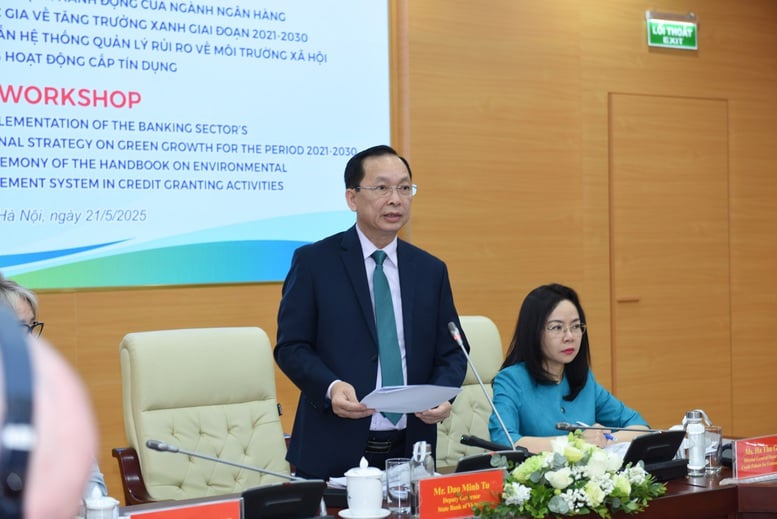
Permanent Deputy Governor of the State Bank of Vietnam (SBV) Dao Minh Tu speaks at the seminar - Photo: VGP/HT
These are the contents discussed at the seminar "Promoting the implementation of the Banking Industry's Action Plan to implement the National Strategy on Green Growth for the 2021-2030 period" and announcing the Handbook on Environmental and Social Risk Management System (MTXH) in Credit Granting Activities, co-organized by the State Bank of Vietnam on May 21 in Hanoi .
Green growth – from policy to practical action
Deputy Governor of the State Bank of Vietnam (SBV) Dao Minh Tu affirmed: Green growth is no longer an option, but has become a mandatory requirement. Especially, in the context of increasingly present climate change, countries around the world , especially developing countries, can no longer delay taking action for the environment.
"Transitioning to a green growth model, economic development combined with environmental protection is the inevitable path towards a sustainable, inclusive and prosperous future," Deputy Governor Dao Minh Tu emphasized.
Without giving a message, Vietnam has clearly demonstrated this commitment through a series of specific strategies and action plans. From the Green Growth Strategy for the 2021–2030 period, with a vision to 2050, to the Action Plan of 134 detailed activities for ministries, sectors and localities. The focus throughout is on promoting green credit and mobilizing resources, especially from the financial sector.
Deputy Governor Dao Minh Tu said: The banking industry has integrated sustainable development goals into credit guidelines, issued a Directive on promoting green growth, and required the integration of environmental and social risk management in credit granting activities.
After nearly 10 years of implementation, by the first quarter of 2025, 58 credit institutions had generated green loans with a total value of more than VND 704,244 billion, an increase of more than 21.2% per year in the period 2017-2024, higher than the overall credit growth rate of the entire economy. Green loans focus on renewable energy, clean energy (more than 37%) and green agriculture (over 29%).
In particular, the banking system is also increasingly interested in assessing environmental and social risks. To date, 57 credit institutions have conducted assessments with a total outstanding debt of up to 3.62 million billion VND, the number of loans assessed for environmental and social risks increased 15 times compared to 2017.
However, Deputy Governor Dao Minh Tu also frankly admitted that there are still many difficulties such as: Incomplete legal framework, limited appraisal tools, long payback period, low access to international green financial resources. At the same time, the capacity of the banking team in the field of environment - society - climate is still a weakness that needs to be strongly improved.
From the perspective of commercial banks, Mr. Doan Ngoc Luu, Deputy General Director of Agribank, said: Agirbank has allocated 30,000 billion VND to finance investment projects in key industries and green projects with a fixed preferential interest rate of up to 24 months from only 6.0%/year, applicable until December 31, 2025 (or until the end of the program scale). 2,000 billion VND is allocated to implement a preferential credit program for individual customers investing in production and business of OCOP products with an interest rate lower by a maximum of 2.0%/year compared to Agribank's lending interest rate floor.
The loan program encourages the development of high-tech agriculture and clean agriculture with a minimum capital scale of VND 50 trillion for customers who are enterprises, cooperatives, cooperative unions, farm owners, etc. Agribank also implements a preferential "green credit" loan program for individual customers with a scale of VND 10 trillion with a floor interest rate of only 3.5%/year for customers borrowing capital to implement plans and projects for production and business of green products and services.
"As a result, Agribank's outstanding loans for green sectors have grown steadily over the years, with the proportion of green project financing in Agribank's total outstanding credit increasing from 0.9% in 2020 to 1.7% in 2024," Agribank leaders shared.
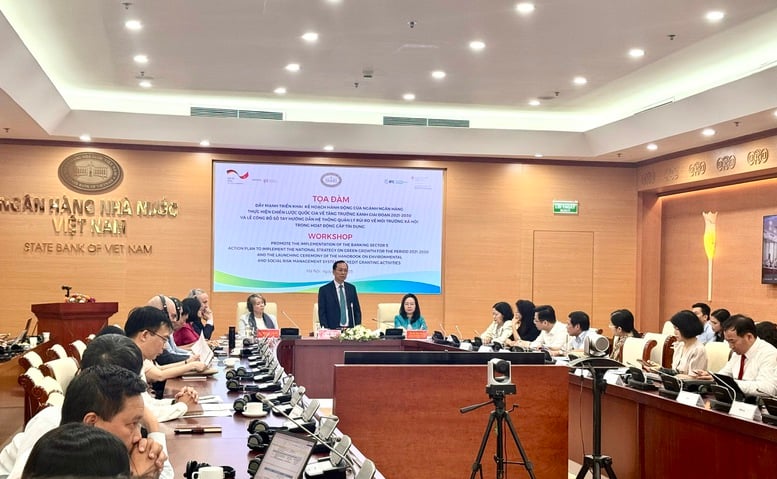
Seminar on "Promoting the implementation of the Banking Industry's Action Plan to implement the National Strategy on Green Growth for the 2021-2030 period" and the publication of the Handbook on Environmental and Social Risk Management System (MTXH) in Credit Granting Activities - Photo: VGP/HT
Learning from international experience , promoting sustainable finance
At the seminar, delegates from ministries, banks and representatives of many international organizations took turns giving practical opinions on promoting green credit.
Representatives of German and Swiss financial institutions also shared lessons in accessing green capital, effectively using development finance instruments and encouraging the private sector to contribute to the green transition.
Many delegates emphasized the role of ESG as a mandatory standard for businesses wanting to access credit in the future. Therefore, publishing ESG reports is not only a trend, but will become a "passport" to access preferential capital sources.
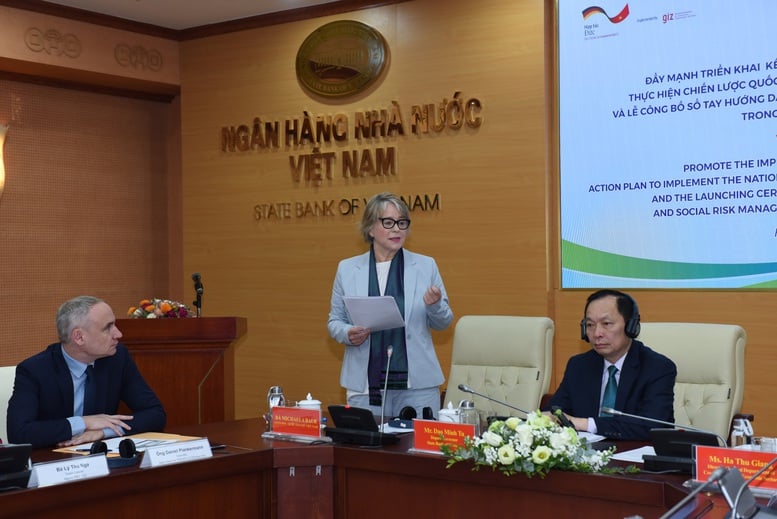
Dr. Michaela Baur - Country Director of the German International Cooperation Agency (GIZ) in Vietnam speaks - Photo: VGP/HT
From the perspective of international organizations, Dr. Michaela Baur - Country Director of the German International Cooperation Agency (GIZ) in Vietnam analyzed: To develop a strong green financial system, it is necessary to have the cooperation of the public - private - international sectors. The German Government, through GIZ, is committed to continuing to accompany Vietnam towards a green economy where no one is left behind.
Ms. Ha Thi Thu Giang - Director of the Department of Credit for Economic Sectors (SBV) said: SBV launched the "Environmental and Social Risk Management System (ESMS) Handbook". The document was jointly compiled by SBV and the International Finance Corporation (IFC), based on international practices, and serves as a "handbook" for credit institutions in integrating ESG into credit activities.
Concluding the seminar, Deputy Governor Dao Minh Tu emphasized the importance of perfecting the legal framework and mobilizing resources for green credit. It is inevitable that countries set standards for exporting goods. The National Assembly and the Government of Vietnam have given strong and clear instructions with specific action programs. However, in addition, it is still necessary to soon complete the system of legal documents as a basis for synchronous implementation by relevant ministries and branches.
For the banking industry, although the current legal framework has a common foundation, it still needs to be improved in terms of management, mechanisms and specific policies. At the same time, raising awareness and training for staff, especially leaders at all levels in the industry, is also an urgent requirement. Therefore, it is necessary to develop unified procedures and regulations for each commercial bank to ensure effective implementation.
Meanwhile, units in the banking industry need to proactively mobilize domestic capital sources to serve green credit programs.
Not only domestic banks, many international banks are now also expressing their interest in the field of environment and sustainable development in Vietnam. Foreign financial institutions are considering expanding cooperation, not only at the policy level but also in direct and indirect investment. Vietnam is considered an attractive destination, especially in areas such as infrastructure development, implementation of the Power Plan VIII, and renewable energy investment - areas that require large and long-term capital.
Therefore, it is necessary to absorb and study the implementation of legal solutions in a drastic manner, while clearly classifying industries and beneficiaries. From there, we can specifically identify preferential and support policies, as well as appropriate authority decentralization mechanisms to create more favorable conditions for commercial banks in the implementation process. A specific list of commercial banks eligible for green investment loans is being developed and supplemented.
In addition, risk analysis, assessment and implementation training will be promoted. Hands-on documents are being developed by GIZ in collaboration with relevant authorities, based on the current legal system, to support commercial banks in effectively implementing green credit.
Enterprises and commercial banks are also encouraged to focus on transparently publishing ESG implementation reports. This is not only an international compliance requirement but also a sustainable development orientation for the domestic financial system. There needs to be a more drastic and clear perspective on ESG implementation in the coming time, along with support mechanisms from the State as well as within the banking industry.
In addition, it is necessary to soon complete credit guarantee mechanisms and provide financial support for green enterprises and green projects through preferential loans or issuing green bonds. A clear legal corridor and appropriate framework will be a prerequisite to promote the healthy development of the green financial market.
In order to effectively control emissions and protect the environment, commercial banks need to establish preferential credit policies that take into account environmental factors. At the same time, harmonize capital sources with practical needs, and receive opinions from banks, ministries and sectors to ensure that the proposed policies are feasible and highly consensual.
Deputy Governor Dao Minh Tu emphasized that 2025 is an important milestone in evaluating the 5-year implementation of the Green Growth Strategy for the 2021-2025 period.
"The State Bank of Vietnam is committed to continuing to: Manage credit growth reasonably, prioritizing green production and circular economy sectors; review and perfect the legal framework on green credit, support small and medium enterprises in accessing capital; promote international cooperation, improve the capacity of bank staff on green credit and climate change; strengthen propaganda on sustainable development...", the State Bank leader emphasized.
Huy Thang
Source: https://baochinhphu.vn/dot-pha-trong-phat-trien-tin-dung-xanh-va-tai-chinh-ben-vung-102250521164442426.htm







![[Photo] Politburo works with the Standing Committees of Dong Thap and Quang Tri Provincial Party Committees](https://vphoto.vietnam.vn/thumb/1200x675/vietnam/resource/IMAGE/2025/9/8/3e1c690a190746faa2d4651ac6ddd01a)
![[Photo] Politburo works with the Standing Committees of Vinh Long and Thai Nguyen Provincial Party Committees](https://vphoto.vietnam.vn/thumb/1200x675/vietnam/resource/IMAGE/2025/9/8/4f046c454726499e830b662497ea1893)



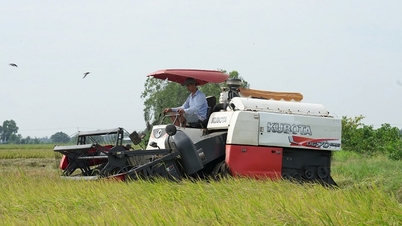













![[Photo] Amazing total lunar eclipse in many places around the world](https://vphoto.vietnam.vn/thumb/1200x675/vietnam/resource/IMAGE/2025/9/8/7f695f794f1849639ff82b64909a6e3d)






















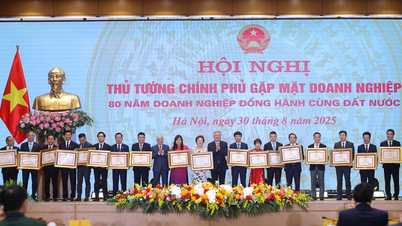







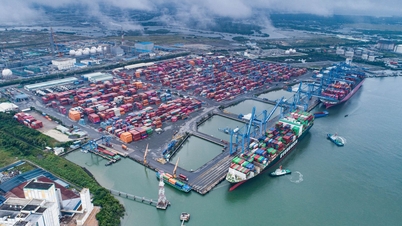









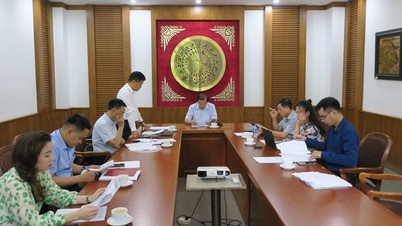



















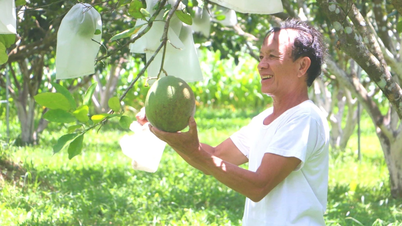








Comment (0)